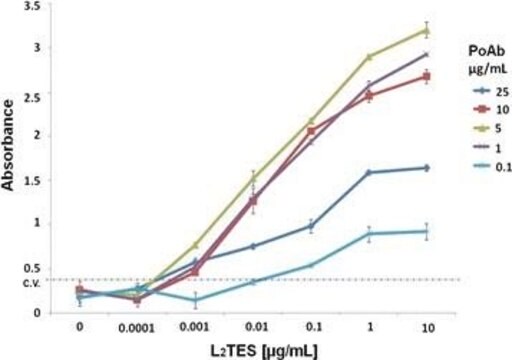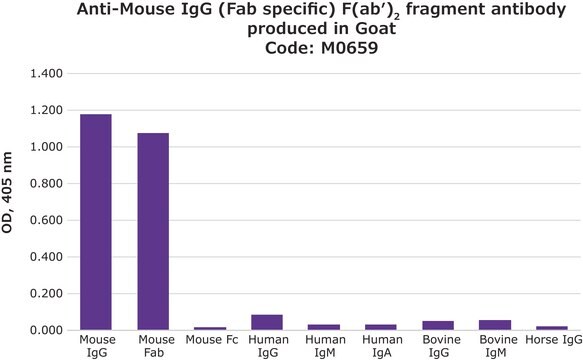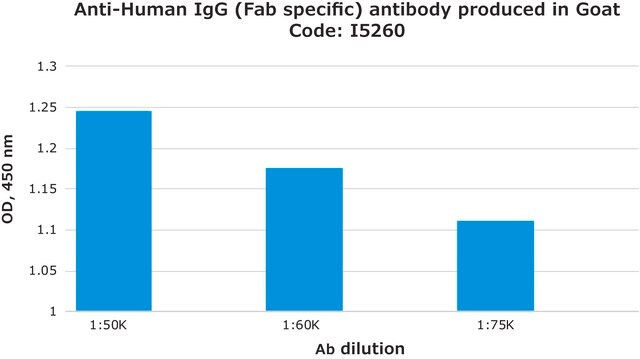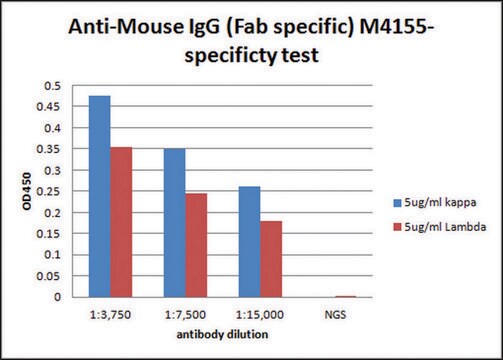M0284
Anti-Mouse IgG (Fc specific) F(ab′)2 fragment antibody produced in goat
2.0 mg/mL, affinity isolated antibody, buffered aqueous solution
Sign Into View Organizational & Contract Pricing
All Photos(1)
About This Item
Recommended Products
biological source
goat
Quality Level
conjugate
unconjugated
antibody form
affinity isolated antibody
antibody product type
secondary antibodies
clone
polyclonal
form
buffered aqueous solution
concentration
2.0 mg/mL
technique(s)
indirect ELISA: suitable
shipped in
dry ice
storage temp.
−20°C
target post-translational modification
unmodified
General description
Immunoglobulin G (IgG) belongs to the immunoglobulin family and is a widely expressed serum antibody. An immunoglobulin has two heavy chains and two light chains connected by a disulfide bond.It mainly helps in immune defense. It is a glycoprotein.IgG is a major class of immunoglobulin.Mouse consists of five immunoglobulin classes- IgM, IgG, IgA, IgD and IgE. Mouse IgG is further divided into five classes- IgG1, IgG2a, IgG2b and IgG3.
Immunoglobulin G (IgG) is a glycoprotein antibody that regulates immune responses such as phagocytosis and is also involved in the development of autoimmune diseases . Mouse IgGs have four distinct isotypes, namely, IgG1, IgG2a, IgG2b, and IgG3. IgG1 regulates complement fixation in mice .
Immunogen
Purified mouse IgG
Application
Anti-Mouse IgG (Fc specific) F(ab′)2 fragment antibody produced in goat has been used in CD117/Sca-1 fluorescence-activated cell sorting (FACS) analysis and to detect bound factor H in factor H binding assay.
Biochem/physiol Actions
Immunoglobulin G (IgG) participates in hypersensitivity type II and type III reactions. IgG helps in opsonization, complement fixation and antibody dependent cell mediated cytotoxicity.
Other Notes
Antibody adsorbed with bovine, equine and human serum proteins
Physical form
Solution in 0.01 M phosphate buffered saline, pH 7.4, containing 0.05% sodium azide.
Preparation Note
Adsorbed to reduce background with bovine, equine, or human samples.
Useful when trying to avoid background staining due to the presence of Fc receptors.
Useful when trying to avoid background staining due to the presence of Fc receptors.
Disclaimer
Unless otherwise stated in our catalog or other company documentation accompanying the product(s), our products are intended for research use only and are not to be used for any other purpose, which includes but is not limited to, unauthorized commercial uses, in vitro diagnostic uses, ex vivo or in vivo therapeutic uses or any type of consumption or application to humans or animals.
Not finding the right product?
Try our Product Selector Tool.
Storage Class Code
12 - Non Combustible Liquids
WGK
nwg
Flash Point(F)
Not applicable
Flash Point(C)
Not applicable
Choose from one of the most recent versions:
Already Own This Product?
Find documentation for the products that you have recently purchased in the Document Library.
The Laboratory Rat (1998)
Liliana Grajales et al.
Journal of molecular and cellular cardiology, 48(4), 735-745 (2010-01-12)
Bone marrow-derived mesenchymal stem cells (BM-MSCs) can be induced to differentiate into myogenic cells. Despite their potential, previous studies have not been successful in producing a high percentage of cardiac-like cells with a muscle phenotype. We hypothesized that cardiac lineage
Producing an Anti-β2 Integrin MAb By a Hybridoma Cell Line in a 2-Liter Stirred-Tank Bioreactor.
Kallel, H, and Fathallah, D, M.
Bioprocess International, 1, 54-59 (2003)
The Immunoglobulins: Structure and Function (1998)
Delayed enrichment of mesenchymal cells promotes cardiac lineage and calcium transient development
Grajales L, et al.
Journal of Molecular and Cellular Cardiology, 48(4), 735-745 (2010)
Our team of scientists has experience in all areas of research including Life Science, Material Science, Chemical Synthesis, Chromatography, Analytical and many others.
Contact Technical Service








